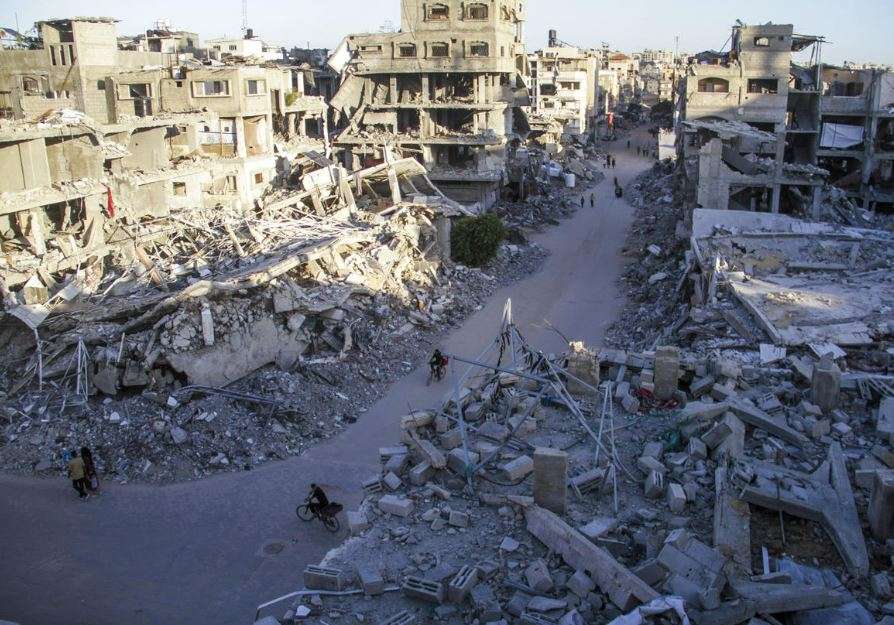The Mideast region remains fraught with tension, with the Israeli-Palestinian conflict at its core. Ongoing peace efforts are being made to stabilize the region, but the stakes are higher than ever. According to Palestinian Health Ministry sources, almost 40,000 people, most of them women and children, have lost their lives due to Israeli military operations since October 8, 2023. On the other side, Israel has suffered more than 1200 casualties, and 200 or more people have been abducted and made hostages in this conflict. Unfortunately, there is no end in sight, and peace seems like a distant dream.
The loss of innocent lives and destruction of property is beyond the purview of human values and ethics. The United Nations estimates that the war has displaced 90% of Gaza’s roughly 2.3 million people, many of whom have been displaced multiple times within Gaza to escape Israeli airstrikes.

“Gaza is beyond the recognition”
“The damage has been colossal and also unprecedented and unheard of in the history of the U.N.,” claimed one the communications director for UNWRA, the U.N. agency that supports Palestinian refugees. Of the 190 buildings UNRWA had in Gaza before the war, two-thirds had been either damaged or destroyed, with several being hit multiple times.
Mideast: The Fragile Nature of Peace Talks
Efforts toward peace in the Mideast are not new, with numerous attempts made over the years to resolve the longstanding conflict between Israel and Palestine. Initiatives like the Oslo Accords in the 1990s, the Camp David Summit, and countless UN-led negotiations have aimed at securing a two-state solution. However, each effort has faced setbacks, from breakdowns in communication to violent outbreaks, leaving peace tantalizingly out of reach.
The recent escalations have brought this fragility back into focus, as violence between Israeli forces and Palestinian groups continues to erupt and turned into war like situation. International actors, including the United States, and regional powers like Qatar, Egypt and Jordan, have intensified their efforts to broker peace, pushing for ceasefires and negotiations.
Unfortunately, the diplomatic negotiations alongside counterparts from Qatar, Egypt, and Israel— the US has categorically expressed hope that a diplomatic deal could still be struck for a ceasefire and to secure the release of remaining hostages in Gaza. The confrontation of Lebanon, Yemen, and Iran with Israel has been a major development in ongoing conflict thus spreading it across the Mideast and endangering the whole region.
The Risk of Misjudgments
One of the gravest concerns in the current landscape is the potential for misjudgments. Both sides are locked in a cycle of mistrust, and even small actions—whether military strikes, provocative political moves, or inflammatory rhetoric—could trigger a larger conflict. Misinformation, misunderstanding, and emotional responses to isolated incidents can quickly escalate, leading to further loss of life and destabilization.
For instance, in recent years, the expansion of Israeli settlements in the West Bank and the Gaza Strip’s ongoing blockade have fueled Palestinian grievances. Conversely, Israeli concerns about security threats from groups like Hamas and Hezbollah continue to drive military actions. These are examples where well-meaning efforts at defense or territorial claims can be perceived as hostile, deepening the divide. In such a volatile environment, any wrong step can spark uncontrollable consequences, drawing in neighboring countries and even global superpowers.
Despite these complexities, peaceful coexistence remains the only long-term solution. A two-state solution, where both nations can live side by side with mutually agreed-upon borders, remains the goal of most peace efforts is a big question.
International diplomatic pressure, coupled with grassroots efforts from both Israeli and Palestinian peace advocates, is essential to arrive at the dialogue and compromise. The stakes extend far beyond Israel and Palestine. A major escalation in this conflict could draw in neighboring countries like Lebanon, Syria, and Iran, destabilizing the broader Mideast. Such a scenario would have ripple effects on global energy markets, migration crises, and international security, with many countries around the world feeling the impact.

